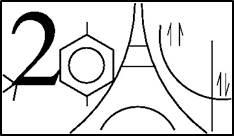Solid state quantum chemical software is absolutely dominated by the Hartree-Fock approximation as applied to describing electrons. This way of thinking seems to be alternativeless. CuNCN, however, is a very special material which may be looked upon as nitrogen-based analog of copper oxide. Although CuNCN is quite similar to the other members of the transition-metal carbodiimide family in terms of stoichiometry and crystal structure, it strikingly differs from them with respect to magnetic behavior. While all others manifest more or less standard antiferromagnetic ground states, the nonmetallic CuNCN exhibits no magnetic scattering of polarized neutrons at either temperature down to several Kelvin. At intermediate temperatures (between 80 and 350 K) CuNCN shows temperature-independent paramagnetism, which changes to a fair Arrhenius decay of the susceptibility below 80 K either without any sign of magnetic ordering as found from various spectroscopic techniques (ESR, NMR, muSR). We argue that the above features may be related to the formation of resonating valence bond (RVB) phases of unpaired electrons residing on Cu2+ ions similar to those which received a considerable attention some time ago as tentative ground states of the high-Tc superconducting cuprates. The Arrhenius decay is attributed to the transition from a medium-temperature non-gapped 1D-RVB state to the low-temperature 2D-RVB gapped state. We have suggested tentative structural manifestations of the 1D- to 2D-RVB transitions confirmed by a recent synchrotron [7] and neutron difraction [8] study.
The RVB states cannot be reproduced by any available solid state quantum chemistry software since any possibility of such a ground state is not programmed. The situation is in a way scandalous in a view of importance of the RVB states for the high-Tc behavior, but also due to its possible wider occurrence in practice proven by our CuNCN experience, which remains elusive due to restrictions of the software.
- Présentation

 PDF version
PDF version
